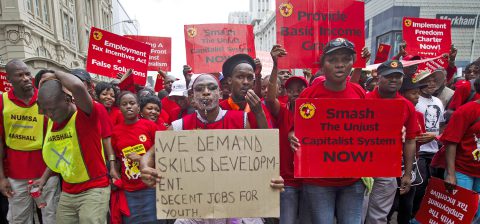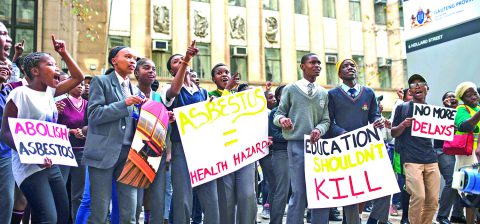Business Day National Women’s Day
Closing The Inequality Gap
Former president Nelson Mandela, who held the view that education was instrumental in fighting inequality and changing the world, said: “There can be no contentment for any of us when there are millions of children who do not receive an education that provides them with dignity and honour and allows them to live their lives to the full.”
With South Africa’s harrowing inequalities, many share the former president’s sentiments that education has a crucial role to play in closing the gap between the rich and poor, and levelling the playing field.
Stellenbosch University Professor of Education Jonathan Jansen says that investing in an individual’s education doesn’t just benefit that one person, but society as a whole. “The economic data is very clear that we are the country with the highest rates of return for education,” he says. “If I get an education as a black person, my parents and siblings also benefit.”
Equal Education’s head of political education and training, Reshoketswe Mapokgole, agrees, adding that when it’s done right, education gives someone the skills to navigate the economics of the world and to find and create jobs. “Education helps you survive in the world economically and socially,” explains Mapokgole. Education isn’t just important for wealth and finances, but also helps people learn about their history and who they are. “It gives us critical thinking skills that help us understand why certain things are happening and how power and different movements got us here.”
Glaring inequalities in a schools
However, quality education in South Africa is not as accessible as one would think. Mapokgole warns about the inequalities within South Africa’s education system, which make achieving equality in society difficult. She cites lack of infrastructure, overcrowded classrooms and lack of resources in many public schools as some of the things that reinforce inequality and notions of inferiority among black learners. As a result, some black learners have a hard time adjusting when they get to tertiary level and, in some cases, even drop out. “For example, when you get to university, you are expected to know how to use a computer, but you may never have learnt how to use one because your school didn’t have computers.”
The inequalities between private and public schools are glaring, and most black working-class children attend under-resourced schools because that’s what their parents can afford. A 2019 Oxfam paper, The Power of Education to Fight Inequality, states that in developing countries, children from rich families are seven times more likely to complete their schooling than children from poor families, further widening the gap between the rich and poor. A 2021 report by Statistics SA shows that close to 3 per cent of 15 year olds and nearly 9 per cent of 17 year olds dropped out of school.
“If you grow up poor in a single- or child-headed household in a rural area or in poverty, your chances of getting through school are less than those of middle-class or upper-class kids,” says Jansen. “This simply means that the rich get richer not just in terms of money, but also opportunity.”
Jansen says inequalities in the education system can only be solved through systemic change. However, this hasn’t been realised because the government doesn’t see the situation as a problem. “The government keeps on saying we’re in crisis mode, we’re going to do everything we can to fix things and then it doesn’t do that,” explains Jansen.
Makgopole agrees that an overhaul of the system is needed to achieve equality and that the fight has to be intersectional. She says women must be given the same resources as men to ensure they are equal players in the game. “Education can only do so much; you can’t create equality if South Africa remains as patriarchal and racist as it is today.”






 Sign-up and receive the Business Media MAGS newsletter OR SA Mining newsletter straight to your inbox.
Sign-up and receive the Business Media MAGS newsletter OR SA Mining newsletter straight to your inbox.